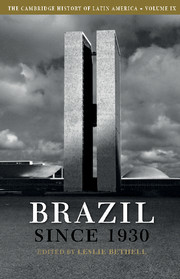Book contents
- Frontmatter
- PART ONE POLITICS
- 1 Politics in Brazil Under Vargas, 1930–1945
- 2 Politics in Brazil under the Liberal Republic, 1945–1964
- 3 Politics in Brazil Under Military Rule, 1964–1985
- 4 Politics in Brazil, 1985–2002
- PART TWO ECONOMY AND SOCIETY
- Bibliographical Essays
- Index
- THE CAMBRIDGE HISTORY OF LATIN AMERICA
- References
2 - Politics in Brazil under the Liberal Republic, 1945–1964
from PART ONE - POLITICS
Published online by Cambridge University Press: 28 May 2009
- Frontmatter
- PART ONE POLITICS
- 1 Politics in Brazil Under Vargas, 1930–1945
- 2 Politics in Brazil under the Liberal Republic, 1945–1964
- 3 Politics in Brazil Under Military Rule, 1964–1985
- 4 Politics in Brazil, 1985–2002
- PART TWO ECONOMY AND SOCIETY
- Bibliographical Essays
- Index
- THE CAMBRIDGE HISTORY OF LATIN AMERICA
- References
Summary
INTRODUCTION
The democratisation of Brazil in 1945–1946 was part of a Latin America–wide, indeed worldwide, wave of democratisation at the end of the Second World War. In 1942, despite considerable sympathy for the Axis powers at the highest level, both political and military, Brazil had allied itself with the United States and Great Britain in the war against Germany, Italy and Japan, on the side therefore of democracy against fascism. In the final months of the War, Getúlio Vargas, who had been in power since the Revolution of October 1930, and the military leaders who had in November 1937 supported him in establishing the Estado Novo dictatorship (which was often mislabelled ‘fascist’) came under increasing international (as well as domestic) pressure at least to liberalise, if not democratise, Brazil’s political system. On 28 February 1945 Vargas announced that elections would be held by the end of the year. And a new Electoral Code (28 May) set a date – 2 December 1945 – for presidential and Congressional elections (with elections for state governor and state legislative assembly to follow in May 1946).
- Type
- Chapter
- Information
- The Cambridge History of Latin America , pp. 87 - 164Publisher: Cambridge University PressPrint publication year: 2008
References
- 1
- Cited by

